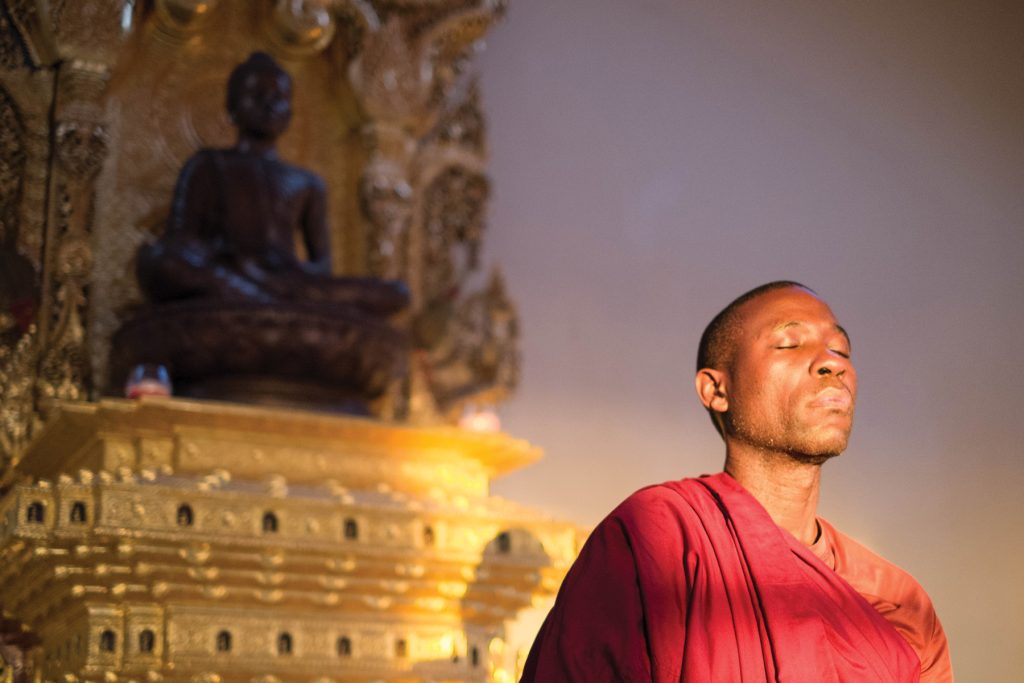When Venerable Bhante Buddharakkhita, now 52, first became interested in Buddhism, it didn’t take him long to realize that the tradition wasn’t very well established in his home country of Uganda—or even his home continent. But after years spent living abroad and tireless commitment, in the course of which he survived an assassination attempt and received many strange looks at his robes, he became one of the first Africans to establish a Buddhist center on the continent.
Born Steven Kaboggoza in Kampala and raised Roman Catholic, the young man who would become Bhante Buddharakkhita didn’t know there were other religions besides Christianity and Islam when he went to India in 1990 to study business at Panjab University in Chandigarh. But he was immediately drawn to two Thai monks who were his classmates.
“When I saw the monks, I felt a connection,” he said. Inspired by the Buddhist teachings they shared with him and their suggestions of “practical ways to reach ultimate happiness,” he spent a few years on a spiritual search, traveling to Dharamsala (home of His Holiness the Dalai Lama and the Tibetan government-in-exile), as well as Nepal, Tibet, and Thailand, where he supported himself working as a scuba instructor.
Kaboggoza realized early on that while there were religious and cultural Tibetan Buddhist organizations all around the world, there was not a single one in Africa. He decided that he would start the first, but he had a long way to go before making his dream a reality. When he asked the Dalai Lama to bless the endeavor, the Tibetan Buddhist leader scratched his head and told him he would need to find friends to help—His Holiness didn’t have any contacts to offer.
After eight years abroad, Kaboggoza returned to Uganda in 1998. His relatives were expecting to welcome a prosperous businessman. What they got, Bhante Buddharakkhita later wrote in his book, Planting Dhamma Seeds in Africa, was a man with a shaved head carrying Buddhist books and scuba gear instead of a briefcase. But he wasn’t there for long. The lack of a spiritual community led him abroad again, first to South America, then to a three-month retreat at Insight Meditation Society in Barre, Massachusetts, where he met his teacher, the Theravada monk Bhante Henepola Gunaratana. He decided to dedicate himself fully to spiritual life and was ordained in California in 2002 by the late Venerable U Silananda.
No matter where he was in the world, no matter what Buddhist tradition he followed, Bhante Buddharakkhita’s dream of starting a center stayed with him. Returning to Uganda, he drew enough local followers and donations from supporters in Asia to purchase land in Entebbe, a town outside of Kampala, the nation’s capital, and in 2005 he opened the Uganda Buddhist Center there. The early years presented many challenges: Dressed in his maroon robes and holding a begging bowl, Bhante Buddharakkhita was frequently mistaken for a member of the Maasai ethnic group, a traditional medicine man, or even a cutting-edge fashionista. When he tried to buy one parcel of land for his center, the neighbors refused to talk to him, suspecting he was a wizard. Though he shrugs off most of these cultural misunderstandings with a laugh, on one occasion he was attacked at his center and narrowly escaped a bullet at close range. He wasn’t discouraged, however, and instead viewed the incident as an opportunity to “transform trauma into dhamma” and strengthen his resolve.
Soon after he returned to Uganda, many of Bhante Buddharakkhita’s immediate family members converted to Buddhism, moved by his teachings and meditation instructions as well as the respect shown him by South Asian Buddhist immigrants in the region. Even his mother decided to ordain; now known as Venerable Dhammakami, she serves as the center’s resident nun. Bhante Buddharakkhita’s sister is raising her children Buddhist, and Bhante has ordained three new monks, men who found their way to the center from Uganda, Rwanda, and Egypt. In 2015 he founded the African Buddhist Union, an umbrella group aimed at uniting practitioners across the continent.
Bhante has also started a number of development projects that benefit the local community. To alleviate a shortage of clean water, the Uganda Buddhist Center drilled a new well on their grounds to share with their neighbors; they also plant trees and run a women’s economic empowerment program in addition to a “Peace School,” a Buddhist version of Sunday school.
Over the years Bhante Buddharakkhita has refined his teaching style, and today he highlights the similarities between African culture and Buddhism. “I use African wisdom as the foundation for my teaching,” he says. He emphasizes, for instance, the similarity between the South African concept of ubuntu [“You are because I am, I am because you are”] and dependent origination, and he begins his talks on karma with a popular Ugandan proverb about cause and effect: “When you eat a mushroom with a maggot in it, it will eat you when you’re in the grave.” He sums up his work this way: “You can’t bring a bucket of sand and drop it there and say, ‘OK, here’s Buddhism.’ You cultivate the soil [with African wisdom] and make sure that it’s very fertile, and then bring the dharma seed and plant it.” The result, he hopes, will be a thriving and uniquely African version of Buddhism.
♦
Related: Buddhism By The Numbers: African Great Lakes Region
Thank you for subscribing to Tricycle! As a nonprofit, we depend on readers like you to keep Buddhist teachings and practices widely available.
